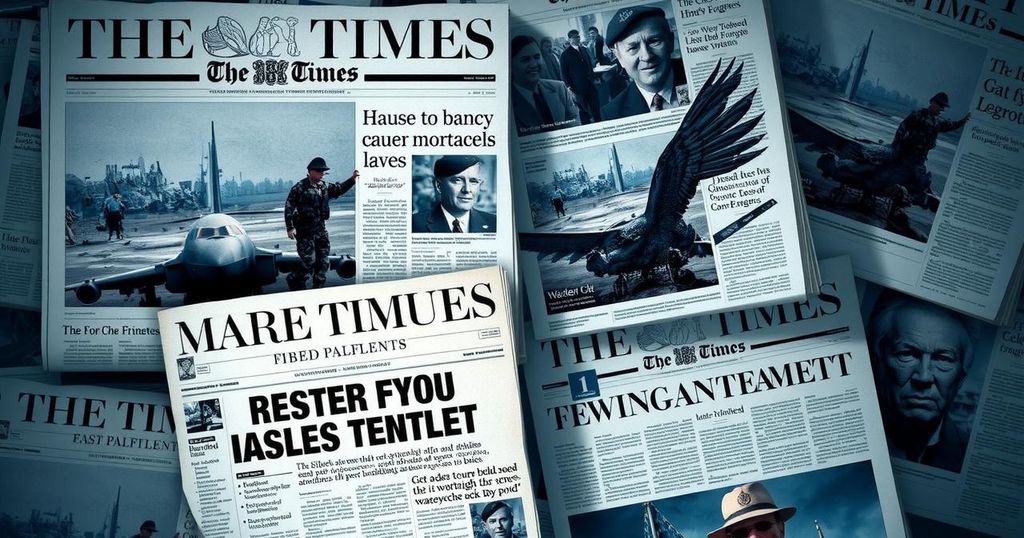Iran Vows Revenge After U.S. Airstrikes on Nuclear Facilities

U.S. airstrikes on Iranian nuclear facilities prompt reactions across media. Trump declares victory, cites focus on nuclear program. Iran vows retaliation; world leaders urge for diplomacy. Growing concerns about regional stability and increased terror threats in the UK. Overall, a critical moment in U.S.-Iran relations.
On Monday, the headlines are ablaze with reactions to the U.S. airstrikes on Iranian nuclear facilities, which President Trump has declared a victory for his administration. The Financial Times reports a significant shift in U.S.-Iran relations, emphasizing that the U.S. is “not at war with Iran” but targeting its nuclear program instead. With airstrikes on three key nuclear sites, the paper describes this bold move as a gamble that could alter the regional dynamics.
Metro highlighted the U.S. operation, labeled ‘Operation Midnight Hammer,’ illustrating the attack’s implications through powerful imagery. Trump is pictured in the Situation Room, overseeing the strikes, while satellite images reveal notable destruction at the Fordo site, which was targeted using bunker buster bombs. Iran’s Foreign Minister reacts, warning about “everlasting consequences” from these aggressive actions.
In a provocative headline, The Sun references its historic “stick it up your junta” from the Falklands, now using “Stick it up your bunker” to capture the moment. The strikes, described as a blitz on a terror state, have ignited calls for diplomacy amid growing tensions, with world leaders urging for de-escalation.
The Guardian emphasizes Iran’s promise of retaliation, labeling the attack as perhaps the most impactful intervention in recent history. Additionally, it discusses President Trump’s alignment with Israel against Tehran, suggesting that his administration may now face a prolonged conflict, which contradicts his earlier pledges to avoid such entanglements.
Similarly, The Daily Telegraph reflects on how Trump, who campaigned on reducing foreign engagements, has transitioned into a wartime president. It shares Secretary of State Marco Rubio’s stern warning to Iran that seeking revenge could be a grave mistake. Amid these discussions, an unusual note is made: French President Macron is seen connecting efforts for UNESCO heritage recognition for French house music to the current international climate.
The Times hones in on the Fordo nuclear facility’s critical status post-strike. Details emerge about Tehran’s potential strategy to disrupt global oil supply by blocking the Strait of Hormuz following a parliamentary vote, positioning Iran’s reaction as one to watch closely.
Both The Daily Express and The Daily Mail bring attention to rising terror threats in the UK, stemming from increased Iranian activity following the U.S. strikes. Comments from UK officials indicate growing concerns that Iran’s reach is significant and could escalate in the wake of the military actions.
On the Daily Mirror’s cover, Trump is again depicted amid his administration’s machinations, with calls from the UK Prime Minister for calm resonating amidst the unrest. With fears of global conflict escalating, the i Paper features the Pentagon briefing timeline of the strikes, illustrating the urgency of diplomatic discussions to prevent further deterioration.
In stark contrast, the Daily Star gives minimal coverage to the U.S. strikes, focusing instead on the news that Noel and Liam Gallagher’s mother believes she is the key to their reunion, illustrating how quickly media attention can shift in crises. This montage of responses showcases both the fraught international climate and how domestic matters can interject into serious global discourse.
In summary, the airstrikes on Iran’s nuclear sites have created a tumultuous wave of responses across various media outlets, highlighting the polarized perspectives surrounding U.S. actions. World leaders’ calls for diplomacy contrast sharply with Iran’s promises of retaliation. This incident marks a significant turning point, as President Trump’s approach shifts from avoidance of foreign entanglements to aggressive military action, raising fears of escalating conflict. The ongoing developments will require careful monitoring as the world watches for the next steps from all involved parties.
Original Source: www.bbc.com






